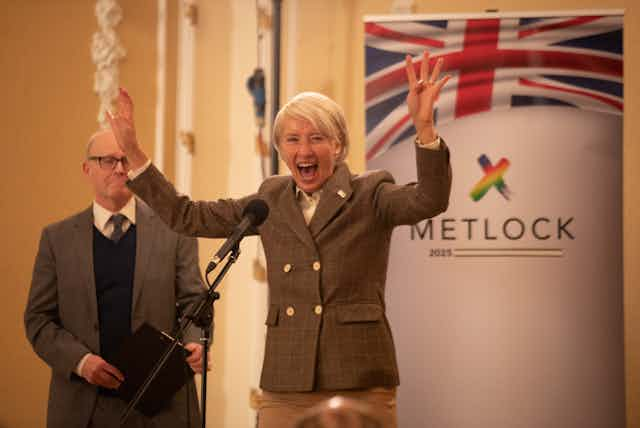SHOULD KING CHARLES DISSOLVE PARLIAMENT AND CALL A GENERAL ELECTION

LABOUR ARE NOT FIT TO RUN THIS COUNTRY , THEY ARE CRUEL , THEY DO NOT CARE AND KING CHARLES HAS THE POWER TO DISSOLVE PARLIAMENT AND CALL A GENERAL ELECTION .
SAVE THE UK NOW
SHOULD KING CHARLES DISSOLVE PARLIAMENT AND CALL A GENERAL ELECTION 22 votes
Comments
-
NO HE SHOULD NOT
I've voted no, because we are a democracy. Having an unelected person decide the people we elected to run the country should be "sacked" would be undemocratic.
2 -
We are definitely through the looking glass now…
2 -
YES HE SHOULD
I don't think we are a democracy , I think we are seeing democracy as an illusion . They place in power who they wish and not who is voted in, when you consider turn out it isn't like they even had a majority , and when you consider the people , allegedly vote in who they think could run the country and the party can turn on that person and choose on that person its a joke .
2 -
I love the government I had weeks of stress and worry and next year I will have all my benefits taken away. I will be voting for them again once I can obtain a postal address following my pending eviction because I have nothing to live off and in to much pain to work more.
2 -
NO HE SHOULD NOT
It may well only be an illusion of democracy.
For me, though, even that illusion, with checks and balances, is preferable to what's going on in, say. the US, North Korea, Russia etc., where everyone's lives are entirely at the mercy on one man's whims.
I guess we'll need to agree to disagree. 🙂
PS I've loathed Labour since Tony Blair became PM. I used to call them Tory-lite. I've dropped the 'lite' element of that description since Starmer snatched the wheel. To me, they are now Red Tories.
2 -
NO HE SHOULD NOT
No because at the moment, the alternativealternatives are far worse, Reform are leading opinion polls, and likely to be the next government, which is a very scary thought.
3 -
NO HE SHOULD NOT
I am going with the no, because it's a democracy option as well.
Democracy does also mean being able to change something through voting. But there are established rules for how this is done.
Let me be clear, in two decades of voting in every single election (local and national) I have never ever voted for the party that has been in power. I have never seen any meaningful political change come from my votes. I also voted remain in the Brexit referendum and have still suffered from the fallout of that policy. But I remember vividly throughout that how Farage and company went on and on about how it was a 'democratic process' and that a revote would be against democracy. We'd decided as a nation on Brexit, so be it.Farage was one of the first to talk about a fresh election to reject the Labour win and that hypocrisy jarred with me. As a nation, Labour were elected in. Did I vote for them? No. But that doesn't mean that their being elected is invalid.
So no. If you start messing around with our democracy because you disagree with one party's values, however obnoxious, then you open up the country to something far more terrifying. And especially given that the real push for a fresh election is coming on social media etc from those who argued passionately that democracy meant accepting the result of a vote, even if you did not agree with it.
Now, should we reform our democracy in time for the next election, with discussions on things like proportional representation - that's another discussion completely. I'm not satisfied with how our democracy works, but cannot support any attempts to undermine it.2 -
NO HE SHOULD NOT
We have a form of hybrid first past the post and proportional representation here in Scotland.
I like it because everyone's views are represented - there are no massive/super majorities and smaller parties have (or can have) influence if they band together on specific issues.
Labour lost their stranglehold in Scotland when me moved from the solely first past the post system, yet they are still able to band together with the other unionist parties to block proposed legislation.
To me, thats better/more collaborative than one party being the only winner.
I think England wiil NEVER adopt any version of PR for Westminster, even something like the hybrid version in Scotland, because it would allow people proper representation and they're desperately wedded to the winner takes all mindset.
Even the Lib Dems went silent on PR (and student loans/fees) when they had a brief taste of power in coalition with the Tories. There's far too much comfort in the two-party system for them to relinquish power to the electorate across the UK/NI, imo.
1 -
NO HE SHOULD NOT
No. An unelected person dissolving parliament? Remind me how that worked out with King Charles the 1st! Seriously, and there is a very important point here, the idea of a monarch telling parliament to have another election is as reprehensible as it is undemocratic. Democracy means of the people. When did people in any kind of power do anything for and of the people here? Democracy also means we have a say in the running of our country and society. So what happens when a party is voted in promising change and then backtracks on almost everything they said? Well, nothing much. Starmer is just continuing vile Tory 'policies' which is stealing money in plain sight and blaming and punishing the rest of us, particularly the poorest and disabled. That is not only undemocratic, it is plainly unjust, unfair and frankly wicked. A 3rd of a million people died as a result of the last round of austerity. Now Starner is embarking on Genocide 2.0. This is an abomination. These cuts will affect me if they are pushed through. Deeply unfair on every level. Let King Charles and others challenge the economic injustice and divisions and the tax avoidance of the wealthiest that underpins much of the class divisions that exist here and then I'll believe he cares.
1 -
YES HE SHOULD
The
parliament
has an upper house, the House of Lords, and a lower house, the House of Commons. At its head is the monarch,
King
Charles III. The
monarch
is the third part of
Parliament
. The British people choose the people in the lower house (members of
parliament
) in elections.
Make of that what you will .
1 -
NO HE SHOULD NOT
Yes, we vote for the lower house. But whatever the case, when did politics last work for the majority ordinary people in this society? It hasn't and for a long time.
We don't get a choice of head of state. I voted for a Labour Party that promised change. They lied. What redress do we have and how is that democratic? We as disabled people have become everyone's punch bag.
0 -
YES HE SHOULD
If they cannot do the job, sack them . How about when they have a vote of no confidence ? none of it is a democracy , they are all in it to line their own pockets .
NOT FIT FOR PURPOSE .
1 -
NO HE SHOULD NOT
Whilst I disagree with a lot of what Labour has proposed, what are the other options? Both the Conservatives and Reform have said the proposals don't go far enough. The grass is not always greener and you could well be looking at far worse cuts.
2 -
NO HE SHOULD NOT
What form of government do you propose then?
It's all fine and well criticising something you don't like, but I was taught we should at least suggest something that would be better when criticising anything.
0 -
NO HE SHOULD NOT
For democracy to fully work requires several things to happen.
- for citizens to vote.
- at least a basic understanding of how the democracy they live in works and
- some basic understanding of what the issues are.
If a large portion of the electorate chooses not to vote, there is little point in complaining that the winning party doesn't have a majority. This would apply to any party.
We don't vote for a particular person, we vote for which party we want to run the country. It is the members of the party who vote on who leads the party. It is the parliamentary party that, if it loses faith in the leader, can then push for them to be replaced.
While the upper house has been widely criticised, it does serve its purpose in scrutinising what the government wants to do.
Most members on here tend not to be interested in politics in general until it affects them personally. This is not a criticism, as this seems to be in line with the public in general.
Simply put, the general trend in the increase in spending on disability is not sustainable. Current US policy will add further stress to this. Either you do nothing and let it eventually collapse, or you deal with it. I don't agree with all they are doing, but politics is about making choices, and as someone else has said, the other main options on the table, Reform and Conservatives, would be far more severe.
The king's power to dissolve parliament is notional. He could, for example, refuse to give royal assent to the government's proposed plans, and this would be a vote of no confidence and dissolve parliament, forcing another general election. This was last done in 1708.
3 -
Why will all your benefits be taken next year gather all your health letters now build a case we can always appeal maybe some get watered down let's hope
2 -
NO HE SHOULD NOT
That's all very fine and noble but the big problem is voting for specific policies promised by parties and then when they are voted in they backtrack and u turn on almost everything. So what do people do then? Wait till another party promises various policies and they get voted in and rescind on everything they promised too? It's all one way, as in the electorate have to believe in a bunch of liars and charlatans generally and there is no redress against politicians like Johnson and Starmer et al going back on almost everything they've said. This is an absolutely corrosive feature of politics and politicians today.
0 -
I can't shake the feeling that the horror outside my window was scripted by Russell T. Davies.
0 -
0
Categories
- All Categories
- 15.7K Start here and say hello!
- 7.4K Coffee lounge
- 101 Games den
- 1.7K People power
- 149 Announcements and information
- 24.7K Talk about life
- 6K Everyday life
- 476 Current affairs
- 2.5K Families and carers
- 889 Education and skills
- 1.9K Work
- 560 Money and bills
- 3.7K Housing and independent living
- 1.1K Transport and travel
- 632 Relationships
- 1.5K Mental health and wellbeing
- 2.5K Talk about your impairment
- 873 Rare, invisible, and undiagnosed conditions
- 935 Neurological impairments and pain
- 2.2K Cerebral Palsy Network
- 1.2K Autism and neurodiversity
- 40.9K Talk about your benefits
- 6.1K Employment and Support Allowance (ESA)
- 20K PIP, DLA, ADP and AA
- 8.9K Universal Credit (UC)
- 5.9K Benefits and income








